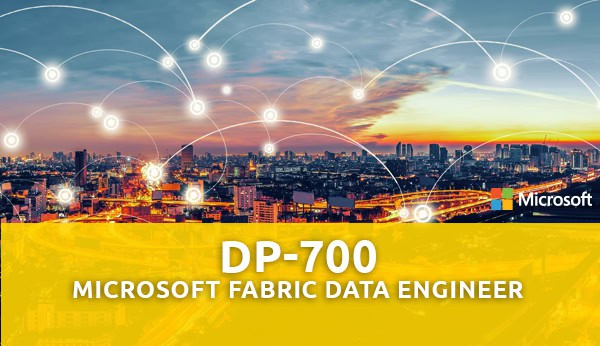
Learning Path 1: Ingest data with Microsoft Fabric
Explore how Microsoft Fabric enables you to ingest and orchestrate data from various sources (such as files, databases, or web services) through dataflows, notebooks, and pipelines.
Modules
- Ingest Data with Dataflows Gen2 in Microsoft Fabric
- Orchestrate processes and data movement with Microsoft Fabric
- Use Apache Spark in Microsoft Fabric
- Get started with Real-Time Intelligence in Microsoft Fabric
- Use real-time eventstreams in Microsoft Fabric
- Work with real-time data in a Microsoft Fabric eventhouse
Exercises
- Create and use a Dataflow Gen2 in Microsoft Fabric
- Ingest data with a pipeline
- Analyze data with Apache Spark
- Explore Real-Time Intelligence in Fabric
- Ingest real-time data with Eventstream in Microsoft Fabric
Learning Path 2: Implement a Lakehouse with Microsoft Fabric
This learning path introduces the foundational components of implementing a data lakehouse with Microsoft Fabric.
Modules
- Introduction to end-to-end analytics using Microsoft Fabric
- Get started with lakehouses in Microsoft Fabric
- Use Apache Spark in Microsoft Fabric
- Work with Delta Lake tables in Microsoft Fabric
- Ingest Data with Dataflows Gen2 in Microsoft Fabric
- Organize a Fabric lakehouse using medallion architecture design
Exercises
- Create a Microsoft Fabric lakehouse
- Analyze data with Apache Spark
- Use delta tables in Apache Spark
- Organize your Fabric lakehouse using a medallion architecture
Learning Path 3: Implement Real-Time Intelligence with Microsoft Fabric
Real-time intelligence in Microsoft Fabric enables analysis of streaming events in real or near-real time.
Modules
- Get started with Real-Time Intelligence in Microsoft Fabric
- Use real-time eventstreams in Microsoft Fabric
- Create Real-Time Dashboards with Microsoft Fabric
Exercises
- Explore Real-Time Intelligence in Fabric
- Ingest real-time data with Eventstream in Microsoft Fabric
- Get started with real-time dashboards
Learning Path 4: Implement a data warehouse with Microsoft Fabric
Explore the data warehousing process and learn how to load, monitor, secure, and query a warehouse in Microsoft Fabric.
Modules
- Introduction to end-to-end analytics using Microsoft Fabric
- Get started with data warehouses in Microsoft Fabric
- Load data into a Microsoft Fabric data warehouse
- Query a data warehouse in Microsoft Fabric
- Monitor a Microsoft Fabric data warehouse
- Secure a Microsoft Fabric data warehouse
Exercises
- Analyze data in a data warehouse
- Load data into a warehouse in Microsoft Fabric
- Query a data warehouse in Microsoft Fabric
- Monitor a data warehouse in Microsoft Fabric
- Secure a warehouse in Microsoft Fabric
Learning Path 5: Manage a Microsoft Fabric environment
Microsoft Fabric is a Software-as-a-Service platform for data analytics. Learn how to manage your environment through Continuous Integration/Continuous Deployment (CI/CD), monitoring, and security.
Modules
- Implement continuous integration and continuous delivery (CI/CD) in Microsoft Fabric
- Monitor activities in Microsoft Fabric
- Secure data access in Microsoft Fabric
- Administer a Microsoft Fabric environment
- Administer a Microsoft Fabric environment
Exercises
- Implement deployment pipelines in Microsoft Fabric
- Monitor Fabric activity in the Monitor hub
- Secure data access in Microsoft Fabric
- Administer a Microsoft Fabric environment
This audience for this course is data professionals with experience in data extraction, transformation, and loading. DP-700 is designed for professionals who need to create and deploy data engineering solutions using Microsoft Fabric for enterprise-scale data analytics. Learners should also have experience at manipulating and transforming data with one of the following programming languages: Structured Query Language (SQL), PySpark, or Kusto Query Language (KQL).
While there are no required prerequisites for taking this course, it is recommended that students have:
- A foundational knowledge of core data concepts and how they’re implemented using Microsoft data services. For more information see Azure Data Fundamentals.
- Experience with data extraction, transformation, loading, and orchestration, such as skills in the DP-203: Azure Data Engineer certification.
- Should also have experience at manipulating and transforming data with one of the following programming languages: Structured Query Language (SQL), PySpark, or Kusto Query Language (KQL).
 Print Page
Print Page
